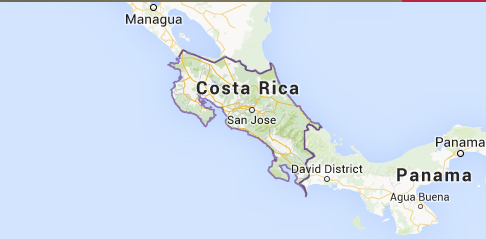
COSTA RICA
A Brief History
Costa Rica has become a household name in terms of tourist destinations within Latin America. Gracefully posing as the bridge between Mesoamerican and Andean cultures', as well as the Caribbean Sea and the Pacific Ocean, this little country beckons the patronage of approximately 1.5 million tourists a year. There are many reasons why Costa Rica calls the attention of foreign travelers and investors while the rest of the region struggles for stability.
Beginning by establishing a national park system that makes up 25% of the entire country, Costa Rica is able to protect lush and exotic flora and fauna that make up 5% of the world's biodiversity (the country itself makes up only 1% of the worlds land mass). They have paved the way for and encourage the spread of ecotourism: a more people and planet friendly way to enjoy what the country has to offer. By nationally protecting the vast riches that the country naturally possesses and laying the foundation for tourism to flourish in a more natural, eco-friendly manner, Costa Rica exudes an openness and hospitality not easily found in other developing countries.
Other things catch one's eye when noticing the warmth of the country; one of those being the fact that Costa Rica was the first nation in the world to voluntarily abolish its army. Under the presidency of Jose Figueres Ferrer, the abolition of the national army was engraved into the constitution in 1949, allowing its funds to be redirected towards education and culture, and its official building revamped into the National Museum of Costa Rica. This act became hugely significant in the years to come by nearly abolishing its illiteracy rate (95% of its population is literate), and allowing the country to focus on humanitarian and environmental efforts, on both domestic and global levels, rather than the country's security.
In Latin America's colonial era, Costa Rica was the southern most province in what was known as Captaincy General of Guatemala. When independence from Spain was declared in 1821, Costa Rica was the last to know, thus any form of physical upheaval was unnecessary and their independence was gained without any human sacrifice. This, along with the fact that its population is largely monochromatic (94% European/Mestizo with only 3% African and 1.7% Indigenous), leaves little room for the scuffles that its Central American neighbors seem to be presented with. Nonetheless, massive immigration mostly from Nicaragua, Colombia and Taiwan, especially during the last decade, is significantly changing the ethnic panorama of the country into a more multicultural society.
Costa Rica is also a huge advocate for peace and humanitarianism holding a seat in the United Nations, the Organization of American States and the International Criminal Court. It's current President, Oscar Arias received the Nobel Peace Prize in 1987 for his work in the Esquipulas II Peace Agreement promoting democracy and peace in Central America.
The Threat of Globalization
It is important to point out the negative effects of globalization that is now threatening Costa Rica's peace tradition and historical progress. In more recent decades, Costa Rica's "Pura Vida" (translated pure life) approach has become threatened due to many factors. The harmony of local communities is being transformed due to the ramifications of the tourist trade, the importation of technology, and the threats of privatization through trade agreements.
Its economic dependence on tourism has encouraged a rapid growth of large scale beach resorts and real estate development, especially on its west coast, thus generating conflict between local communities and developers over the use of water, (a resource that is becoming increasingly scarce in the region) as well as generating land disputes as a result of public land privatization.
Because of its educational level, Costa Rica has become a hotspot for technology and pharmaceutical development. Previously Costa Rica focused on its agricultural sector but has recently announced a 7 year plan for technological development giving tax credits to companies like Intel and Proctor & Gamble, which sees in the country's location the key factor for their choice: Costa Rica has direct ocean access to the rest of Latin America, the US, Western Europe, South-East Asia, and Russia.
The Central American Free Trade Agreement (CAFTA) with the USA (at this point not ratified yet by the Congress due to public pressure) has become one of the issues of controversy and division among the population. Costa Ricans' especially treasure the state-run telecommunications and power companies, as well as their universal health insurance system, which could be negatively impacted by the action of transnational corporations favored by CAFTA.
Costa Rica maintains a positive global reputation due to its continued commitment to peace, human rights and the environment. Due to accords such as CAFTA, and other booms in private development, this reputation could be in jeopardy. A significant number of Costa Rican citizens are afraid that their successful development model based on social security and solidarity will become drastically transformed.


La Fortuna de San Carlos, Zona Fluca | info@cultourcostarica.com | (506)2469-1279
